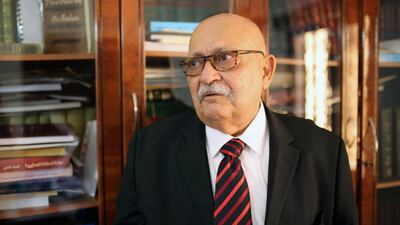A veteran Sudanese lawyer heading a government-appointed commission to investigate the deadly breakup of a sit-in protest last June has vowed to seek out the truth.
Speaking to The National, Nabil Adib told of the daunting challenges facing the panel, from logistical and administrative issues to witness protection and technical analysis of evidence.
He expressed his annoyance with local news media speculation about the commission’s work and how, in the end, he did not see himself as answerable to anyone. His only duty was to the pursuit of the truth.
“I don’t respond to popular demands, or the demands of the government, the military or anyone else for that matter,” Mr Adib said at his Khartoum office. “I am conducting a criminal investigation that has no relation to their demands or what they have to say.
“They [critics, members of the public and social media commentators] view themselves as the overseers of the commission. That’s incorrect. What is correct is for them to leave the committee alone to do its work,” said Mr Adib, a 76-year-old constitutional and criminal lawyer.
Abdalla Hamdok, Sudan’s transitional prime minister, appointed the panel on October 20. He gave the commission three months to complete its investigation and present its findings, a timeline that can be extended by three months on condition sufficient progress has been made.
“We are trying to do everything we can to complete our work within the three-month timeframe but not at the expense of accuracy or justice,” Mr Adib said.
“If we need to extend the timeline, we will. But, as of now, we are following a plan that will allow us to finish by the time set for us.”
The sit-in protest began on April 6, five days before the military removed Omar Al Bashir, Sudan’s dictator of 29 years who was sentenced to two years in a correctional facility after being found guilty of corruption.
Protesters remained in place afterwards to press demands for the generals to hand over power to a civilian government.
When the security forces moved in on June 3, the sit-in was 58 days old.
Activists maintain that the June 3 attack left at least 130 dead, including about 40 whose bodies were later found in the Nile. Hundreds more were injured, they said.
The Health Ministry initially put the death toll at 61, but findings published in a July investigation ordered by the ruling generals at the time put the number at 87.
A trauma centre in Khartoum documented 16 cases of rape, a number believed to be low because of the social stigma of reporting sexual assault.
The appointment of the commission led by Mr Adib came after repeated calls for justice from protest and civilian groups as well as the families of the victims. But the seasoned lawyer maintains that his pursuit of the truth is not emotional and that he will pay no heed to calls for the commission to speed up its work or entertain attempts to influence the process.
“I have a position that is neither political nor sentimental,” he said. “This is a criminal investigation that’s responsible, not just before the nation and the people, but before God and my conscience.”
The commission will try to identify those behind the June 3 killings and bring charges against them, and also establish the final number of those killed, wounded and missing.
Mr Adib said the commission’s work began with trying to meet basic requirements, including finding a safe headquarters, administrative and technical staff and an online site.
He said other challenges included interviewing and protecting a large number of witnesses and reviewing documents, as well as collecting and documenting video clips of the June 3 events.
“We need to do all this while making sure that what we are examining had not been meddled with or doctored," Mr Adib said.
"We also need technical reports. I personally cannot tell you where a certain type of bullet is available in Sudan or who has them.”
Many Sudanese eagerly await the findings and the arrests that could result from them.
They regard the June 3 violence as a major, albeit grim, milestone in the modern history of Sudan, a nation that rose against dictators in three popular uprisings – in 1964, 1985 and 2018 – since independence in 1956.
Witnesses and activists are uncertain about who is to blame for the dawn violence on June 3.
Many of them accuse hardline Al Bashir loyalists in paramilitary groups or placed in the security forces by his government, especially the feared domestic security agency.
The former ruling generals have said they had given the order to clear a troublesome section of the sprawling sit-in site, not the entire area. But they say things spiralled out of control.
The leader of a paramilitary force that was once loyal to Al Bashir, the Rapid Support Force, accused infiltrators in its ranks of being behind some of the violence.
But Mr Adib appears unperturbed by a likely major shake-up in the security agencies and the military when the results of his commission’s investigation are publicised in January, or soon after.
He said he was undeterred by the prospect that he might have to indict senior members of the security forces.
“This is something that does not worry me,” Mr Adib said.
“If there is enough evidence pointing to the involvement of a certain individual and I don’t mention that, then I am squandering the rights of the nation and those who seek retribution.
"That’s why we need to be extremely careful.”































